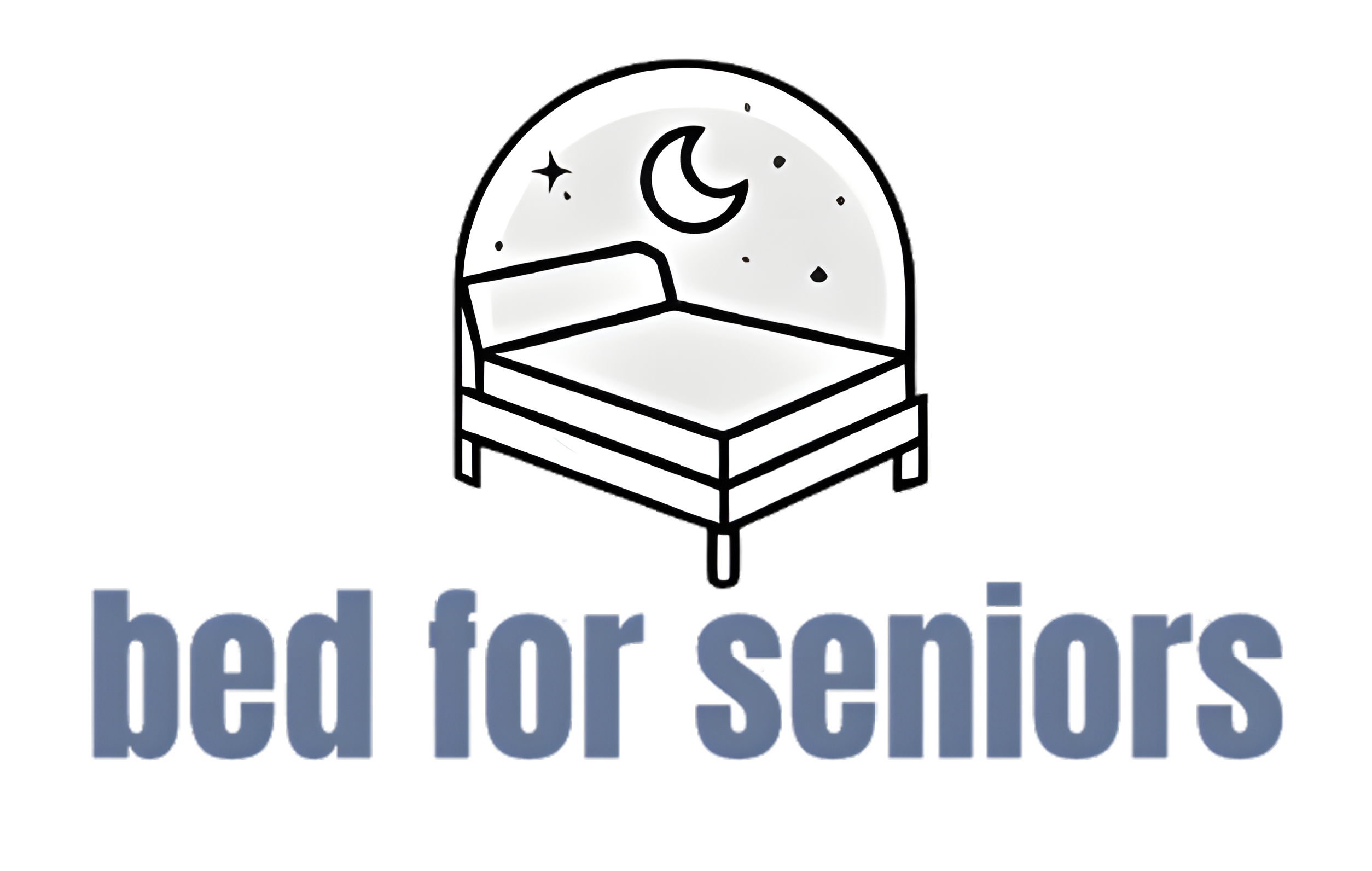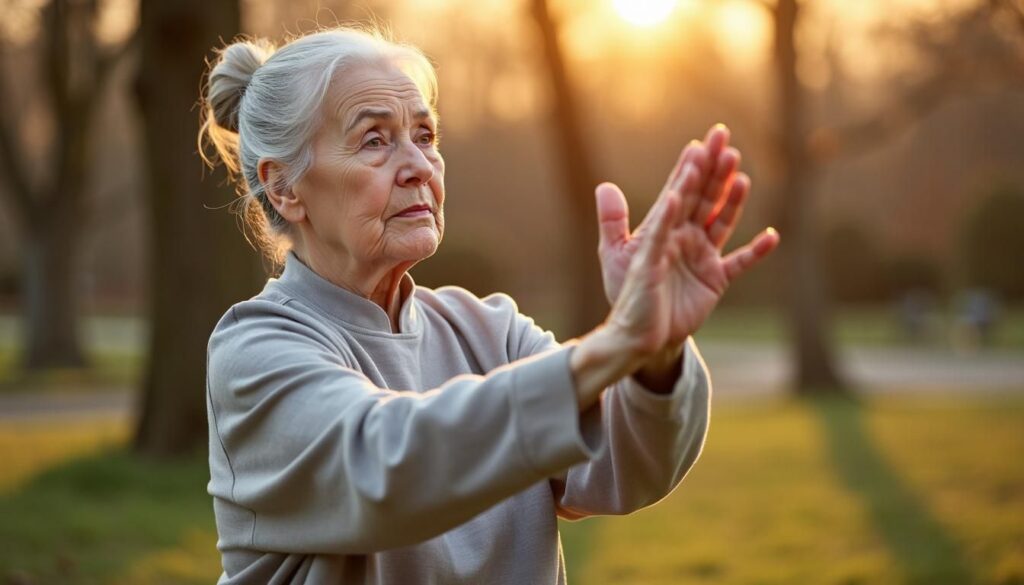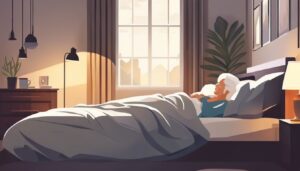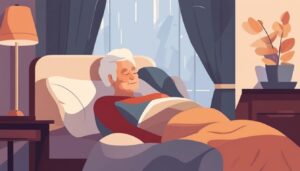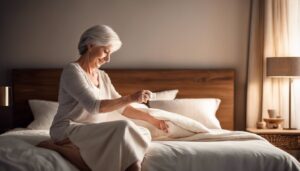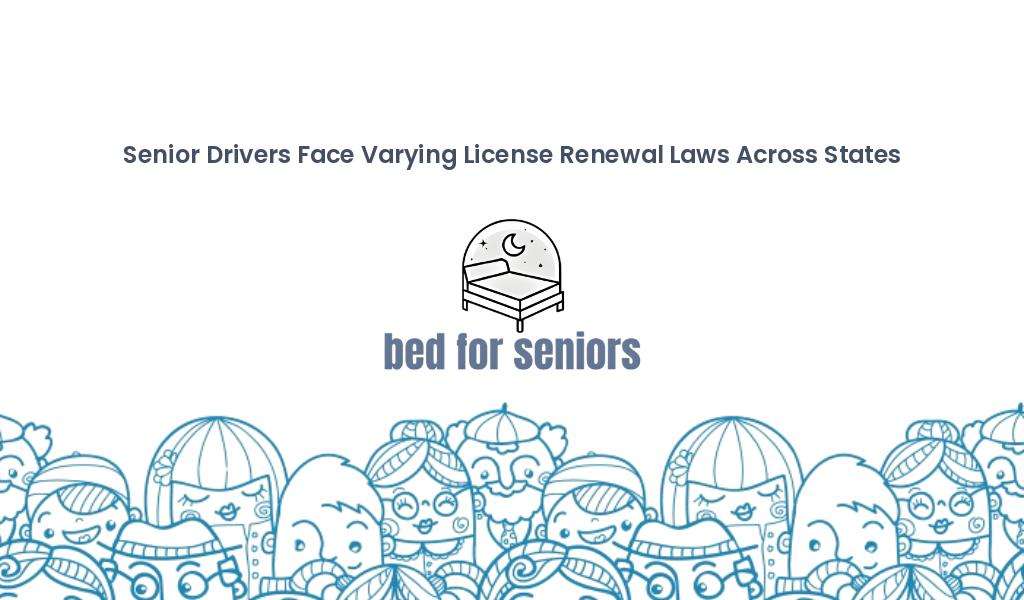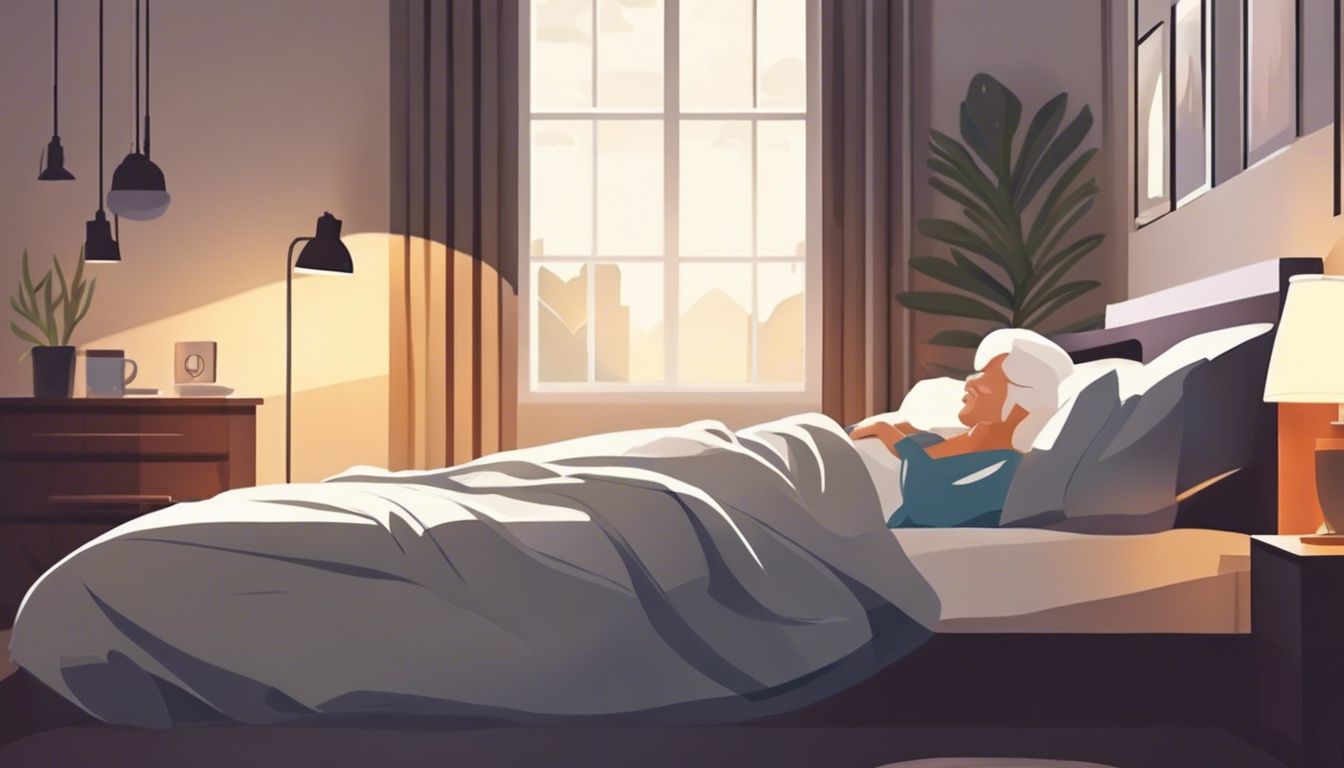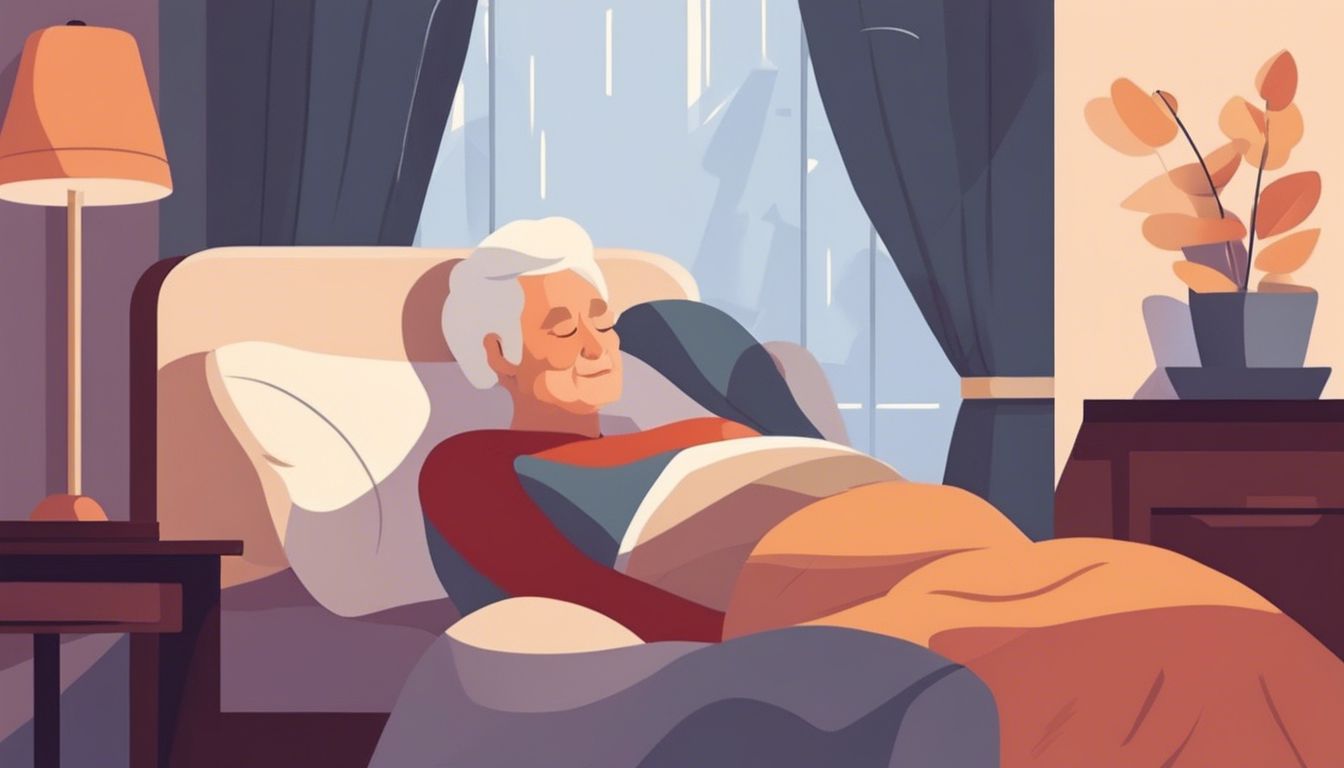Sleep troubles can make life hard, especially for seniors. Research shows tai chi and art therapy improve sleep quality. This article shares ways to help without using medicine. Read on for easy tips.
📋✅
- Tai chi, art therapy, and music help seniors sleep better.
- Changes in lifestyle like eating less caffeine and doing light exercises improve rest.
- Making the bedroom quiet and dark helps a lot.
- Tools like sleep trackers and apps can track sleep patterns for improvements.
- Mind practices like meditation make falling asleep easier.
Overview of Non-Pharmaceutical Approaches
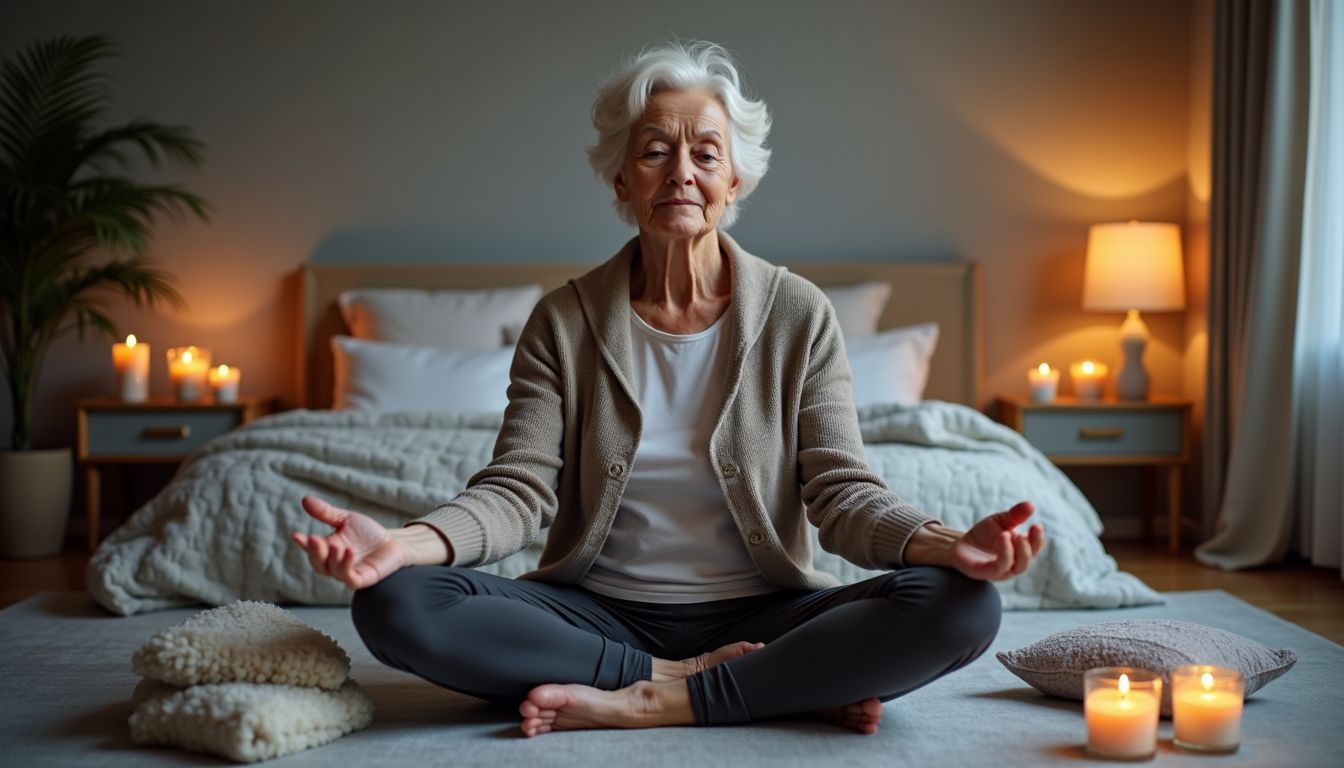 Non-pharmaceutical approaches present a diverse selection for improving sleep quality in older adults, moving away from traditional medication pathways which might be unsuitable due to potential side effects or interactions with existing health problems.
Non-pharmaceutical approaches present a diverse selection for improving sleep quality in older adults, moving away from traditional medication pathways which might be unsuitable due to potential side effects or interactions with existing health problems.
These strategies concentrate on behavioral changes, cognitive therapies, environmental modifications, lifestyle adjustments, and the use of certain technologies and complementary health practices—all focused on improving sleep without the dependency on pharmaceuticals.
Behavioral strategies such as sleep hygiene education and stimulus control therapy address habits that can negatively impact sleep. Cognitive Behavioral Therapy for Insomnia (CBT-I), a key component in this toolset, mainly targets the thought patterns and behaviors leading to chronic insomnia.
Environmentally, simple changes such as reducing noise levels or optimizing room temperature can create a better environment for rest. Technologies such as sleep trackers or applications aim at monitoring and promoting improved sleeping patterns through data analysis and personalized advice.
Lifestyle adjustments include dietary changes—decreasing caffeine consumption—and integrating regular physical activities into everyday routines. Mind-body techniques like meditation or yoga play a crucial role in reducing stress levels which can obstruct high-quality rest.
Moreover, social interaction through community activities or volunteer work promotes a general sense of well-being that indirectly encourages healthier sleeping patterns.
Integrating these methodologies provides caregivers with useful strategies for improving seniors’ quality of life through enhanced sleep, making sure every night leads to days filled with energy rather than fatigue caused by inadequate rest.
The secret to improved sleep is not only in our pre-bedtime routines but also in how we enrich our everyday lives.
Behavioral Interventions
Changing behaviors can improve sleep in seniors. Look at sleep cleanliness, stimulus control therapy, and sleep limit therapy for better rest.
Sleep Hygiene
Sleep hygiene is important for good rest. It helps seniors avoid sleeping problems and insomnia. Here’s how:
- Keep a regular sleep-wake cycle. Go to bed and wake up at the same time every day.
- Avoid caffeine, tobacco, and alcohol before bedtime. These can make it hard to fall asleep.
- Make sure the bedroom is just for sleep. Remove TVs and computers.
- Exercise regularly but not right before bed.
- Don’t eat big meals or drink a lot of fluids close to bedtime.
- Make the bedroom comfortable for sleeping. It should be dark, quiet, and cool.
- Limit naps during the day to 30 minutes or less.
- Spend some time outside every day if possible.
- Use calming activities like reading or listening to soft music as part of a pre-sleep routine.
- If you can’t sleep after 20 minutes, leave the bedroom and do something relaxing until you feel tired again.
Following these steps can improve sleep quality for seniors without needing medicine.
Stimulus Control Therapy
Stimulus Control Therapy helps seniors sleep better by setting a regular cycle for sleeping and waking up. This method makes the bedroom a place only for sleep and intimate moments, keeping out other distractions.
It trains the brain to think of bed as just for resting.
A calm bedroom is key for good rest.
This therapy tells older adults to go to bed only when they are truly tired. They should get out of bed if not asleep in 20 minutes. Then, do something relaxing until they feel sleepy again.
This reduces the frustration around trying to fall asleep and improves overall sleep quality in seniors.
Sleep Restriction Therapy
Sleep Restriction Therapy limits time in bed to actual sleep hours only. Seniors start with fewer hours, then slowly add more as they sleep better. This method improves sleep efficiency—how well they sleep.
For example, if a senior sleeps six hours a night but spends eight hours in bed, Sleep Restriction Therapy would have them stay in bed for only those six hours at first. Gradually, they increase time spent asleep before adding more time in bed.
This technique helps seniors fall asleep faster and wake up less during the night.
Cognitive Behavioral Interventions
Cognitive Behavioral Interventions help seniors sleep better by changing their thoughts and actions around bedtime. These techniques, like therapy for racing minds or learning new bedtime habits, make falling asleep easier.
Explore more ways to improve night rest without medicine.
Cognitive Behavioral Therapy for Insomnia (CBT-I)
Cognitive Behavioral Therapy for Insomnia, or CBT-I, is a strong tool against sleep problems in older adults. Experts say it’s the best first choice for treating primary insomnia. This therapy combines parts like cognitive therapy with methods that control stimulus and restrict sleep.
It helps by changing thoughts and behaviors that mess up sleep.
CBT-I teaches seniors how to handle things that keep them awake and makes their bed a cue for sleep only. They learn to leave the bed if they can’t sleep and return only when sleepy.
This method improves not just how long they sleep but also how well they do so. With CBT-I, most find their way back to good sleeping patterns without needing pills.
Sleeping well means living well.
Next up: Multicomponent Therapy brings together various strategies to tackle insomnia from more than one angle.
Multicomponent Therapy
Multicomponent therapy combines different techniques for better sleep. This method uses stimulus control, relaxation training, and sleep hygiene education. Studies show it works better than one technique alone.
This approach helps seniors fall asleep faster and stay asleep longer.
Next, we explore how paradoxical intention can play a role in improving sleep quality.
Paradoxical Intention
Paradoxical intention is a method where seniors are told to stay awake instead of trying to fall asleep. This approach deals with the fear of not being able to sleep by doing the opposite—staying awake on purpose.
It reduces worry about sleep and makes falling asleep easier.
This strategy confronts sleep disturbances head-on. By encouraging staying awake, it lowers anxiety around bedtime, helping improve overall sleep quality in older adults. Next, we’ll explore how adjusting lighting and noise can also make a big difference in sleeping well.
Environmental Modifications
Changing the sleep space can make a big difference in how well seniors rest. Simple changes, like reducing noise and adjusting room temperature, can lead to better sleep without medicine.
Adjusting Lighting and Noise Levels
Adjusting light and noise in a room improves sleep. Bright light therapy can reset our sleep cycles. Here’s how:
- Use dim lights in the evening to signal the body it’s time to relax.
- Keep bedrooms dark during sleep. Use blackout curtains or eye masks.
- Expose seniors to bright light in the morning. It helps wake them up.
- Reduce noise with sound machines or earplugs for uninterrupted sleep.
- Place nightlights in hallways or bathrooms for safety without disturbing sleep.
- Avoid blue light from screens before bed because it can make falling asleep hard.
- Set up lamps with adjustable brightness for reading or relaxing activities before sleep.
- Choose calming sounds like rain or white noise to help fall asleep faster.
- Keep room temperatures cool, around 65 degrees, for better sleep quality.
- Fix squeaky doors or floorboards that might wake someone during the night.
Easy changes like these make a big difference in sleeping well, especially for seniors.
Optimizing Bedding and Room Temperature
Good sleep is key for seniors. Comfortable bedding and the right room temperature can make a big difference. Here’s how:
- Choose breathable sheets. Cotton or bamboo materials keep seniors cool all night.
- Use a supportive mattress. It should hold the body well to prevent pain.
- Pick the right pillow. Memory foam adjusts to the head, offering better support.
- Keep the room cool. A temperature around 65-70 degrees helps most people sleep better.
- Limit light before bedtime. Dark curtains can block out street lights and early sun.
- Reduce noise levels with white noise machines or soft earplugs if needed.
- Consider a weighted blanket for added comfort, which some find soothing.
Next, let’s explore how adjusting lighting and noise levels contributes further to improving sleep quality in seniors.
Minimizing Electronic Disturbances
Electronic disturbances hurt sleep. Reducing them helps seniors sleep better.
- Turn off TVs, computers, and phones an hour before bed. These gadgets emit blue light, disrupting sleep.
- Use night mode on devices if needed after sunset. This mode reduces blue light.
- Keep cell phones out of the bedroom. Phone noises and lights can wake you up.
- Use white noise machines to block out sudden sounds from electronics.
- Replace digital clocks with non-ticking analog ones to avoid light and noise.
- Adjust device settings to lower brightness and sound at night.
- Encourage reading a book instead of using a tablet or e-reader before sleep.
- Disconnect Wi-Fi at night to resist the temptation of checking devices.
- Cover electronic displays or use blackout tape over small lights that stay on.
- Choose alarm clocks with red numbers; they are less likely to disturb sleep cycles.
These steps ensure a quiet, dark room ideal for sleeping without electronic interruptions.
Optimizing the Bedroom Environment for Better Senior Sleep
Creating a sleep-friendly bedroom can greatly improve sleep quality for seniors. Small changes lead to big results in comfort and rest.
- Use room-darkening shades to block out light, helping maintain the circadian rhythm.
- Keep the room temperature cool, between 65 and 70 degrees Fahrenheit, for optimal sleep conditions.
- Choose a comfortable mattress and pillows that support the body well.
- Reduce noise levels with earplugs or a white noise machine to prevent sleep disturbances.
- Limit use of TVs, smartphones, and computers in the bedroom since their screens can disrupt sleep patterns.
- Install soft, warm lighting for use before bed to avoid harsh lights that wake up the brain.
- Place a small nightlight in the room to prevent falls if getting up at night is necessary.
- Make sure bedding is clean and inviting, using breathable fabrics for sheets and blankets.
- Arrange furniture safely and simply to minimize clutter and create a peaceful environment.
- Adapt the bedroom layout for easy access to the bathroom during the night if needed.
These steps ensure a senior’s bedroom supports healthy sleep habits without relying on medication.
Lifestyle and Diet Adjustments
Lifestyle and Physical Exercise changes make a big difference in sleep quality for seniors. Eating right, staying active, and cutting down on late-night drinks can lead to better rest…
Keep reading to find out how simple swaps and habits can improve nighttime rest.
Regular Physical Activity
Regular physical activity helps seniors sleep better. Moderate exercises like walking, tai chi, and gentle aerobics make a big difference. Experts say doing these activities can lead to good sleep.
Seniors should aim for light to moderate activities each day. This keeps their body healthy and improves sleep at night. Good examples are swimming, dancing, or gardening. These easy actions help seniors feel tired in a good way when it’s time for bed.
Diet and Nutrition Considerations
Eating right helps seniors sleep better. Cut down on caffeine, tobacco, and booze at night. These things can make sleeping hard. A good diet full of nutrients is key for good sleep health in older adults.
Foods rich in vitamins help a lot.
Next, we talk about not drinking too much water or juice before bed to avoid waking up at night.
Limiting Evening Fluid Intake
Cutting down on fluids in the evening can help seniors sleep better. This simple step prevents trips to the bathroom at night. Too much fluid before bed leads to more wake-ups. So, it’s smart not to drink lots right before sleep.
An ounce of prevention is worth a pound of cure.
Next up, let’s talk about how meditation and mindfulness can also improve sleep for seniors.
Mind-Body Techniques
Mind-body methods connect your thoughts and body to improve sleep. Practices like breathing exercises, slow movements, and sitting still help calm the mind and ready you for rest.
Meditation and Mindfulness
Meditation and mindfulness help older adults sleep better. A study in JAMA Internal Medicine, April 2015, shows this. People with trouble sleeping saw improvements after practicing these techniques.
Meditation calms the mind. Mindfulness focuses on the present. Both reduce stress that can make sleeping hard.
These methods are easy to try at home. They need no special tools or medicine. Seniors can learn them through books, apps, or classes. Regular practice makes a big difference in sleep quality and overall health.
Yoga and Tai Chi
Yoga and Tai Chi are good for sleep. They help people with cognitive decline, like those with dementia. Studies show they improve sleep quality in older adults. A study on September 16, 2016, said Tai Chi Qigong helped older adults sleep better at night.
These activities mix movement and relaxation. Doing them makes your body tired in a good way. This helps you fall asleep faster and sleep deeper. Plus, they lower stress which often keeps seniors awake at night.
So, adding Yoga or Tai Chi to daily routines can make a big difference in how well seniors sleep.
Guided Imagery and Relaxation Exercises
Moving from body movements like yoga and tai chi, let’s focus on the mind. Guided imagery and relaxation exercises play a big role in helping seniors sleep better. These methods use calming thoughts and visuals to relax the body and mind.
It’s a type of relaxation therapy that cuts down tension and worry. This makes falling asleep easier.
Sleep is just a dream away with guided imagery.
In these exercises, seniors imagine peaceful scenes or stories. This process helps reduce stress, leading to faster sleep onset without medicine. Breathing deeply is also part of this practice.
Techniques such as progressive muscle relaxation are used too. They teach how to slowly tense and then relax each muscle group. This trains the body to recognize what being truly relaxed feels like, encouraging deeper rest at night.
Social and Community Engagement
Talking and doing things with others keeps seniors happy and healthy. Being part of group activities or helping out can make a big difference in their sleep.
Maintaining Social Connections
Friends and family matter a lot for seniors’ sleep. Studies show being around loved ones helps them sleep better. It makes them happy and less worried. Also, joining clubs or groups can boost their mood and sleep.
Next up, let’s talk about engaging in community activities…
Engaging in Community Activities
Joining community programs helps seniors sleep better. These programs offer tai chi, art therapy, mindfulness awareness practice, and music reminiscence therapy. They teach new skills and help seniors stay active.
Tai chi improves balance and calms the mind. Art therapy lets seniors express themselves creatively. Mindfulness keeps their minds focused on the present, reducing stress. Music reminiscence therapy brings back happy memories through old songs.
Next comes volunteer work, where seniors can contribute to society while staying engaged and busy.
Volunteer Work
Volunteer work helps seniors sleep better. By joining community activities, they stay active and involved. This has shown good results for sleep quality. For example, tai chi and art programs make a big difference.
They help older adults feel part of something bigger.
Next up, we’ll look at complementary health approaches like aromatherapy and acupuncture that also improve sleep without needing medicine.
Complementary Health Approaches
Try adding smells, needle therapy, or music and art activities for a different sleep fix. Get ready to explore more.
Aromatherapy
Aromatherapy uses smells from oils to help people sleep better. Research shows it really helps seniors sleep more and better, especially those in hospitals. It’s a safe way to make their sleep quality better without using drugs.
Many studies agree that smells like lavender oil can make the difference for older adults struggling with sleep. This method is part of non-pharmacological interventions recommended for improving sleep disturbances in seniors.
It works well alongside environmental changes and relaxation techniques, making it an effective choice for caregivers looking to improve seniors’ nighttime rest.
Acupuncture
Moving from aromatherapy to another complementary health method, acupuncture stands out for seniors’ sleep improvement. This ancient practice inserts tiny needles into specific body points.
It helps many older adults sleep better. Studies show acupuncture can be a main way to handle chronic insomnia.
Research supports using this method alongside yoga and acupressure to boost sleep quality in seniors. Yet, more high-quality studies are needed before doctors make it a common recommendation.
A review noted its benefits for elderly people’s sleep outcomes, underlining its value among non-drug options.
Music and Art Therapy
Music and art therapy contribute to better sleep quality for the elderly. These therapeutic practices are an element of a neighborhood initiative, utilizing music recollection and artistic expression to uplift mood.
Research published in Asia Pacific Psychiatry in September 2015 supports their aid in battling depression and anxiety. Elderly individuals reported feeling more restful after participating in these sessions, leading to more effortless sleep onset.
These natural methods aim to soothe the mind through imaginative engagement. Music therapy typically involves either engaging with tranquil melodies or revisiting old songs that resonate with pleasant memories.
Art therapy provides a platform for the elderly to convey their thoughts and emotions through varied hues and forms, consequently mitigating stress. Both approaches have demonstrated commendable improvement in sleep quality among seniors, bypassing the need for medication.
Technology and Sleep Aids
Tech tools like sleep monitors and apps can help improve rest. They track sleep patterns and suggest changes for better sleep.
Use of Sleep Trackers
Sleep trackers help seniors understand how well they sleep. They show the time spent in deep, light, and REM sleep stages. These devices also track heart rate and movements at night.
This data helps find patterns or problems in sleep cycles.
Doctors use this information to suggest changes for better sleep. For example, if a tracker shows less deep sleep, they might recommend more physical activity during the day or adjusting bedtime routines.
Next up are apps designed to improve rest…
Apps for Sleep Improvement
Apps for sleep improvement offer easy ways to help seniors sleep better. These apps use sounds, stories, and meditation to relax the mind before bed. Examples include Calm, Sleep Cycle, and Headspace.
They track sleep patterns too. This helps find what helps or hurts sleep quality.
Next up are light therapy devices. They adjust the light in a room to match natural sunlight. This can fix sleep schedules and improve mood during waking hours.
Light Therapy Devices
Light therapy devices can help seniors sleep better. These devices use bright light to fix their body clocks, especially if they wake up too early in the morning. Caregivers can set these lights to turn on slowly, mimicking sunrise.
This gentle wake-up helps start the day right and improves sleep at night.
Using these tools is easy. Place them in the bedroom so that when it’s time to wake up, the light begins its job. It’s a simple way to support seniors in getting good rest without medicine or hard efforts.
Plus, studies show this method works well for fixing sleep problems linked to aging.
Preparing for Sleep
Ready your mind and body for sleep with simple steps. Think about a calming pre-sleep routine, jotting down worries, and deep breathing to relax.
Establishing a Pre-sleep Routine
Establishing a pre-sleep routine helps seniors sleep better. It is part of cognitive behavior therapy for insomnia (CBT-I).
- Set a fixed bedtime and wake-up time. Doing this keeps the body’s internal clock in check.
- Limit evening fluid intake to avoid nighttime trips to the bathroom.
- Create a relaxing bedtime ritual, like reading or listening to soft music.
- Keep the bedroom dark, quiet, and cool to make falling asleep easier.
- Avoid screens an hour before bed because the light can disturb sleep.
- Choose comfortable bedding that supports good sleep.
- Practice deep breathing or meditation to calm the mind before sleep.
- Write down worries in a journal earlier in the evening, not right before bed.
- Do some gentle stretches or yoga poses to relax muscles.
- Use aromatherapy with soothing scents like lavender to promote relaxation.
Following these steps every night makes falling asleep and staying asleep easier for seniors.
Journaling to Reduce Stress
Writing down thoughts and worries in a journal helps seniors sleep better. It lets them clear their minds before bed. They write about what bothers them or things they did during the day.
This way, they don’t keep thinking about these things when trying to sleep.
Journaling changes how seniors think about sleep. If they believe certain ideas make sleeping hard, writing helps challenge these thoughts. For example, if someone thinks, “I can never sleep well,” journaling may help replace this with, “Sometimes I do sleep okay.” Changing these beliefs improves relaxation and makes falling asleep easier.
Breathing Exercises
Breathing exercises help seniors sleep better. They are easy and quick. You can do them before bed to relax the mind and body. Deep breaths in and slow breaths out lower stress. This method improves sleep quality without medicine.
Teach seniors simple breathing techniques. Show them how to breathe deeply through their nose and out through their mouth. These steps calm the heart rate, making it easier to fall asleep.
Practice these every night for best results.
Conclusion
Non-drug methods really help seniors sleep better. Things like tai chi, art therapy, and music can make a big difference. These ways are part of programs that check and improve sleep using tools like the Pittsburgh Sleep Quality Index.
They show us sleep gets better without needing medicine. More studies will show us how these methods work best. This is great news for older adults looking to find restful nights without pills.
FAQs
1. What is a non-pharmaceutical approach to improve sleep quality in seniors?
A non-pharmaceutical approach focuses on methods other than medication to improve sleep quality. This can include cognitive-behavioral therapy, adherence to circadian rhythms, and environmental interventions.
2. How effective is cognitive-behavioral therapy for insomnia in seniors?
Cognitive-behavioral therapy for insomnia (CBT-I) has shown promising results in clinical trials and systematic reviews. It helps address the underlying causes of sleep disorders without relying on sedative-hypnotics or antidepressants.
3. Can adhering to natural circadian rhythms help improve sleep quality?
Yes, maintaining regular sleeping patterns aligned with our biological clock or circadian rhythm can significantly reduce issues like difficulty falling asleep or frequent wakefulness during the night.
4. Are there specific environmental interventions that aid better sleep?
Certain environmental changes such as reducing noise levels, controlling room temperature, and limiting light exposure can enhance sleep duration and lessen instances of periodic limb movement disorder or restless legs syndrome.
5. Do medical conditions affect senior’s sleep quality?
Absolutely! Conditions like cardiovascular disease, cancer, obstructive sleep apnea all contribute towards poor sleep health among older adults which could lead to physical decline over time.
6. Is there any standard measurement tool for assessing improvements in seniors’ sleep quality?
Yes! Tools like Pittsburgh Sleep Quality Index (PSQI) are widely used by professionals from American Academy of Sleep Medicine and American Geriatrics Society for evaluating progress made through various interventions.
